#encanto phantie fanon
Text
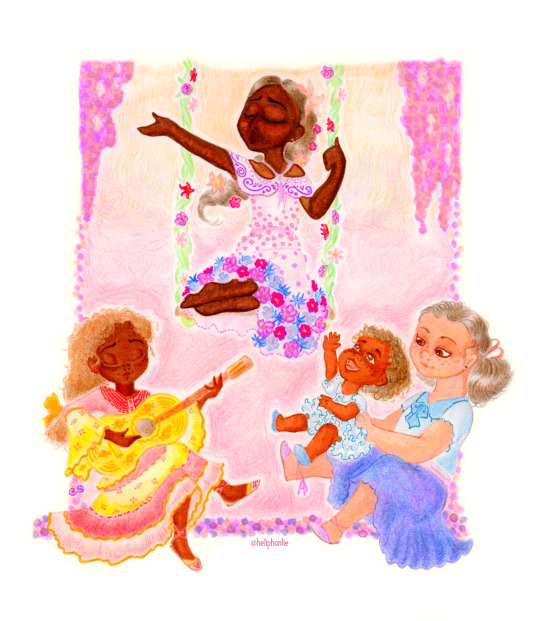
Song for little sister.
Canción para hermanita.
Little headcanon/speculation for the Mirabirthday:
In the first minutes of the movie, we see Mirababy-turning-five in the nursery, getting told the story of the miracle, presumably for the first time in her life. She also gets to see and learning of the magic candle. While it’s a part of initiation for the gift receiving, it’s staged as if she gets introduced to the whole deal only now. Seemingly the magic was regarded as regular part of her family’s life up to that moment, until she learns of origin and value of it. The candle, meanwhile, is always at full display, reminding everyone of the significance of miracle and the cost of it. We also get a view of interior of nursery, the walls adorned with Mirabel’s drawings of her family members and herself as sort of fairy being, as anticipation of her own upcoming magical power. There are almost all family members depicted – Abuela, Mira’s parents, sisters, aunt, cousin, save for Félix and Camilo and, most poignant, Bruno. Well, maybe, Mira wasn’t too close to her peer cousin (boys and girls aren’t always getting along in that age, after all), and I have no ready explanation for Félix (but wait for it), and absence of Bruno just further confirms that Mira is not only having no memories of her uncle while coming of age, she didn’t even acknowledge his presence when he was around. Where I’m going with all of that? I'm getting closer to the point.
Mirabel’s eye condition, requiring the glasses to wear, is a myopia (it was confirmed by Jared Bush in the Q&A online session) she appears to share with her father. Now, regarding if the village even has practicing optometrist to identify condition this early in life, it could have been some time until it became apparent for the people to notice, along with the little kid obtaining verbosity to descript it herself. We don’t see anything before the birthday, so may it be it was detected only recently, and she’s got the glasses shortly before the events of the movie? (Also, I presume, near-sightedness is a metaphor for Mirabel, being too focused on her own worth inside of family, lacking ability to see the struggles other family members undergo with the burden of miracle, and, eventually, the issue on the larger scope, and, due her short temper and go-get attitude, missing proverbial foresight. In this regard, she even serves as dualist to Bruno for the most of the story, despite both having similar concerns for others. But this is the subject for different topic I eventually want to address. Agustín also doesn’t appear to be particularly observant about other’s feelings, or at least, able to read the room, though in his case, it may be general absent-mindedness and/or social awkwardness.)
For the reason (people sometimes picking on) why her mother not appearing to cure it for her, while “official” answer given was her not seeing eye condition as serious defect but instead a part of charm, it’s very wholesome and humanitarian explanation, but I’m going with different theory: Julieta’s ability doesn’t expand beyond inflicted injuries and diseases, she can’t fix conditions that are woven into one’s DNA and run in generations. Or maybe her powers are only helping people with increasing their own immunity and the speed of regeneration from the harm, so it doesn’t work with congenital defects either.
My assumption is, it’s even possible, the glasses were in fact a present for Mirabel for her fifth birthday, with “Abre los ojos” line referring not just to the event of getting introduced to the family’s legacy and upcoming duty to carry it, but to the simultaneous event of obtaining ability of clear sight (both literal and figurative). And for the referred above absence of imagery of Bruno in Mira’s drawings, it’s because, while she might be aware of his existence, she just didn’t have the opportunity to get clear look of him, due his general disengagement in gatherings and the growing distance from the rest of family (it also may be, as Mirabel herself, he used to avoid being caught on the camera for his own reasons – seeing himself not worthy or dismissive of his own image, so no definitive portraits of him in the house, adult ones at least). That, and her being too short to reach to that family tree picture in the dinner room.
One thing that detracts my reasoning is, on that fairy self-portrait Mira depicts herself with glasses too, but maybe, she was aware of getting them for present this day and had drawn the picture in advance while anticipating the fateful event. There are always some loophole to maintain integrity of headcanons, you see:D
#encanto#encanto fanart#disney fanart#dolores madrigal#isabela madrigal#luisa madrigal#mirabel madrigal#la familia madrigal#madrigal family#encanto headcanon#encanto hc#encanto phantie fanon#phantie ramblings#phantieart
39 notes
·
View notes
Text
«Blessing» (Encanto fan comic)
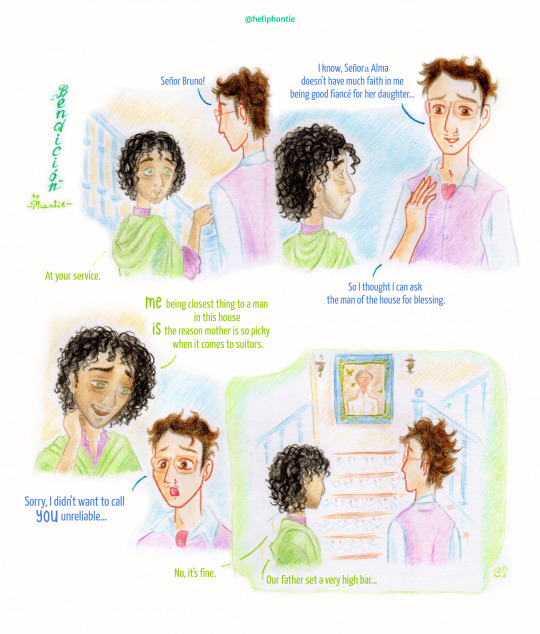
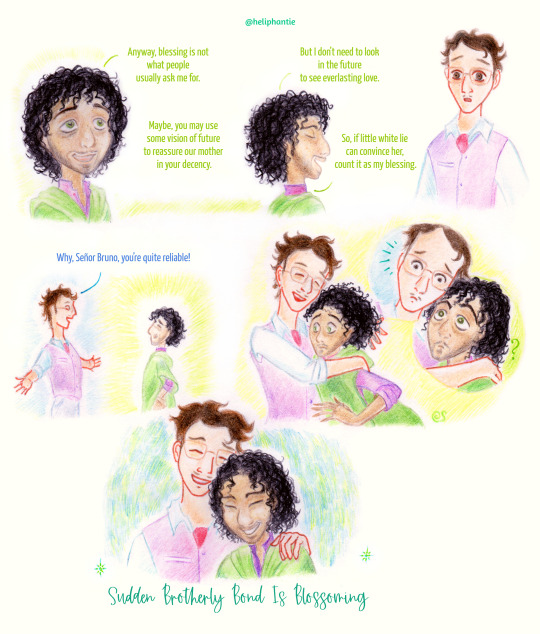
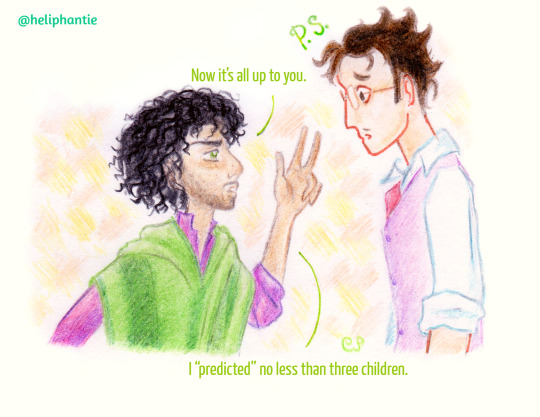
An idea (and eventual part of headcanon) all the way from year ago. Whole scenario was based on that one brief interaction of Agustín with Bruno during “All of You”. Sadly, I’ve got disappointed with myself in process and left it unfinished for indefinite time, and as result, decided to rework it from scratch now, but the scenario stayed the same.
At the time, it wasn’t clear if in canon Agustín was always part of Encanto or arrived here as adult (info from artbook says he came “from big city”), but later it was confirmed by director Bush that all inhabitants of the village were either born here or are refugees from 50 years ago, and it’s just Agustín’s family that has city roots. I decided to leave that aspect ambiguous, as it had no specific bearing on the conversation, but originally it was supposed he wasn’t (and isn’t at the moment) deeply familiar with the Madrigal family and its hierarchy. My headcanon has been updated since that, so expect eventual follow-up on that backstory.
Anyway, whatever connection did stem from that, it wasn’t developed further much in next 20+ years due to Bruno growing progressively more reclusive and reluctant to forge relationships beyond his blood relatives. But as feeling of disconnection becomes stronger, he’s still determined to protect happiness of his loved ones, and not above using benefit of indisputable trust people have in his words, especially when his guts saying it will be right. He (and the rest of Madrigals) may not realize full extent of powers given to him, but as they’re based in natural traits, his are rooted in sharp intuition which, in some cases, doesn’t even require activation of visions. For why he’s so confident on the matter in this case… the story for another time.
#encanto#encanto fanart#disney fanart#fan comic#fancomic#bruno madrigal#agustín madrigal#encanto agustín#encanto headcanon#encanto hc#encanto phantie fanon#phantieart
88 notes
·
View notes
Text
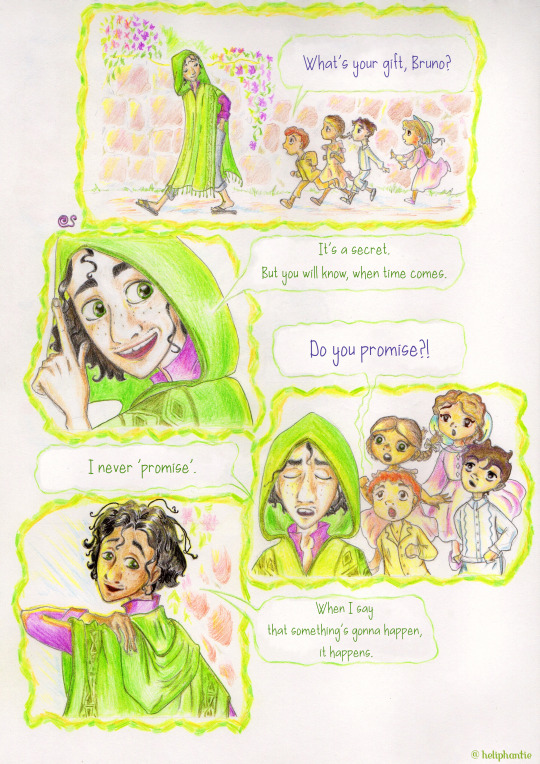
Year ago, April 2022, I resumed drawing after almost 15 years of hiatus. Now, looking back, I decided to do “Top 10” of noteworthy for me works of last year, without any ranking. Starting with this one, which I had drawn April 2.
Very first mini-comic (most of the rest of which is still in first draft/script stage). Although it’s one of very early drawings, I still like it the same and generally am content with how it turned.
Cool teenage Bruno, master of foreshadowing.
I just imagined young (15-16) Bruno entertaining kids with the story of his family and the miracle in the same way Mirabel did, and came up with this scenario, but still had to figure context of why Bruno’s gift would be kept secret.
So the headcanon is, Bruno didn’t really start to serve community with his gift until late adolescence, because Alma considered that people may start pester the kid with requests which he wouldn’t be able to reject and become exhausted, so his power was used only in urgent cases, on behalf of Alma and confidentially. Probably, Alma considered the same with two other kids, but in the end abilities of Pepa made it nearly impossible to hide, and Julieta loved cooking and taking care of people since childhood and wasn’t getting overwhelmed with it.
(The secrecy also can explain why his door, originally placed between these of his sisters, moved into more secure place.)
And, while he didn’t had to use the gift *that* often (during 10+ years), these cases were still stressful and proved he had to control himself to not getting too invested in lives of his clients and stay impartial toward their fates, even when he was a witness of, sometimes rough, future for them. But he carried his duty without complaining (like the rest of family), developed stoicism and got used to fighting anxieties and hardships on his own, so he remained genuinely upbeat for long time, until, around mature age, burnout had overtaken him. (Director stated that it started to creep on him in late adolescence, but after all, sudden drops in mental well-being are specific to teenage.)
It also happened that there weren’t other kids of triplets age in the village for long time, so they had mostly just themselves for company growing up. But as new kids started to appear, it’s Bruno who gained admiration of the young ones. For grown-ups and young adults, he was mostly a subject of (often alarming) rumors and, at best, a lonesome weirdo, but in the eyes of children he’s as worthy of idolization as any mysterious and bohemian older person who acts friendly to them, thus a totally cool guy:) And he seemed to like playing along with it.
Useless trivia: the children’s names (from left to right in upper panel) - Pablo, Sofia, Juan and Cristina. They’re not related to any background characters, just random kids. Although it would’ve been funny if some of villagers who were sharing ominous stories about him used to be his followers in their childhood.
#encanto#encanto fanart#disney fanart#fan comic#bruno madrigal#encanto headcanon#encanto hc#encanto phantie fanon#phantie first year top ten#phantieart
59 notes
·
View notes
Text
Cool teenage Bruno, master of foreshadowing.

(April 2022.)
First, I just had a thought of Bruno entertaining kids with the story of the miracle and family in the way Mirabel does in the movie, while being in his teenage years. Then I came up with this scenario, and had to form headcanon for context.
Basically, Bruno didn’t start doing public service until sometime in late adolescence, because Alma was actually considerate that people may start pester him with requests while he’s very young, so she resorted to using his power only in urgent situations when citizens asked her advice, and confidentially. The need in secrecy is what lead to his door moving far from others, into more secure place (and considering the door as we’d see it is connected to tower, maybe he also didn’t use that place for “professional needs” until starting making predictions routinely as his major job). So up to some point his gift was partially secret, partially regarded as some rumor, going largely unspoken. Probably, Alma would do the same with two other kids, but it was nearly impossible to hide Pepa’s abilities, and Julieta liked cooking and making remedies since childhood, and it wasn’t taking toll on her.
While it was confirmed by director Bush, Bruno did used the gift frequently while “growing”, and it was apparently challenging for him physically (rejected element of story) as well as mentally, hence originating of his rituals, I refuse Alma to be painted as willful exploiter, but rather somebody who was in dark about hardships her children would overcoming, because they, and Bruno in particular, felt they have to be grateful and carrying their duties without complaining (as later Luisa and Isa did). But he turned to be very good in adapting and fighting his anxieties on his own and staying genuinely upbeat, at least for some prolonged period until, somewhere in the middle of life, burnout didn’t start to creep on him.
Also, it happened that for long there weren’t other kids of triplets age in the village, so they’ve grown having no peers around to form friendships, having mostly just themselves for company. Yet, as time moved, it’s Bruno who gained admiration of new kids in village. For grown-ups and young adults, he was mostly just weird scrawny teen, but in the eyes of children he was that mysterious and bohemian grown-up person that kids tend to idolize and look up, especially when such person is slightly shady-looking, and he seemed to like playing along with it.
To note, these are random kids, no relation to any background people from the movie, although it would be funny if some of villagers who shared sinister stories about him were his devoted followers in their childhood.
#encanto#encanto fanart#disney fanart#fan comic#encanto headcanon#encanto phantie fanon#bruno madrigal#phantieart
11 notes
·
View notes